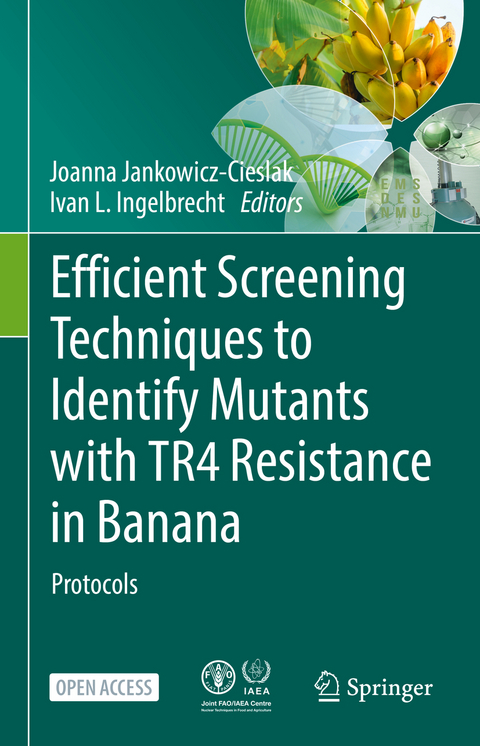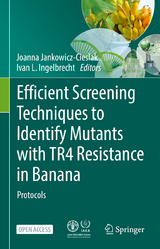Efficient Screening Techniques to Identify Mutants with TR4 Resistance in Banana
Springer Berlin (Verlag)
978-3-662-64914-5 (ISBN)
Bananas are a staple food for over 500 million people and are also an important cash crop. Fusarium wilt, caused by the fungus Fusarium oxysporum f.sp. cubense, is one of the most destructive diseases of banana globally. Since the 1990s, an aggressive variant of this fungus, called Tropical Race 4 (TR4), severely affected banana plantations in Southeast Asia from where it spread to other continents, including Latin America, where the global banana export market is primarily centred. TR4 is a soil borne pathogen making the disease difficult to contain.
The Joint FAO/IAEA Centre of Nuclear Techniques in Food and Agriculture implemented a Coordinated Research Project (CRP) 'Efficient Screening Techniques to Identify Mutants with Disease Resistance for Coffee and Banana" (2015-2020). This CRP brought together experts from Asia, Europe and Africa in addition to experts of the Joint FAO/IAEA Centre to develop resistance against TR4 through mutation-assisted breeding. Induced mutagenesis is particularly attractive in case of banana since most cultivated bananas are seedless, thus hampering conventional cross breeding.
This Open Access book is a compilation of the protocols developed under the CRP specifically for TR4. The first part covers methods for mutation induction, including the integrated use of innovative single-cell culture with mutagenesis techniques. The book also describes up-to-date phenotypic screening methods for TR4 resistance in banana under field-, greenhouse- and laboratory conditions. Finally, molecular and bioinformatics tools for genome-wide mutation discovery following Next Generation Sequencing are also described.
Given the imminent threat of Fusarium Wilt TR4 on banana production globally, it is our hope and intention that the book will serve as a timely reference and guide for banana breeders and pathologists worldwide who are committed to the genetic improvement of banana for Fusarium wilt resistance.
lt;b>Joanna Jankowicz-Cieslak is a plant molecular biologist and genome scientist with over 17 years' experience in the field of molecular biology, genomics and crop improvement with the use of mutation breeding techniques. She holds a PhD in biological sciences from the Jagiellonian University in Krakow, Poland. In 2019 she obtained a Habilitation degree in biology from the University of Silesia, Katowice, Poland for the work entitled "Techniques of induction and detection of genetic variability in functional genomics and breeding of plants of special importance in developing countries". Her research interests focus on the development and adaptation of new tools, protocols and guidelines for mutation induction and discovery in vegetatively propagated crops such as banana. She has extensive experience with induced mutagenesis, in vitro tissue culture, and the application of genomics tools for mutation-assisted breeding of banana. She established the first reverse genetics approach for banana showing that mutations are stably induced and inherited over successive generations. She has (co-) authored over 60 original research papers, monographs and book chapters as well as co-edited three protocol books.
Ivan Ingelbrecht (Belgian) holds a PhD in Plant Molecular Biology. Since 1994 he has worked on crop improvement for universities and international organizations in Africa, Asia, Europe, Latin America and the USA. He has expertise in the use of modern biotechnology and molecular genetics tools for the improvement of (sub)tropical crops as a project lead and senior R&D Manager at the International Institute of Tropical Agriculture, Nigeria (www.iita.org ) (2001-2010). He is currently involved at the Joint FAO/IAEA Centre of Nuclear Techniques in Food and Agriculture at the IAEA (www.iaea.org) as Head of the Plant Breeding and Genetics Laboratory in the coordination of R&D in the field of mutation-assisted plant breeding. His current research is focused on integrating advances in plant cell culture and -omics technologies with conventional mutagenesis techniques for food security, adaptation to climate change and transboundary disease resistance in seed and vegetatively propagated crops, including Fusarium wilt in banana. He has published over 80 research items, including 56 peer-reviewed journal articles, and co-authored 3 books and 6 book chapters in the field of plant breeding and biotechnology.
Part I: Mutation Induction.- Chapter 1. Physical mutagenesis and population development in Musa spp.- Chapter 2. Gamma irradiation of embryogenic cell suspension cultures from Cavendish banana (Musa spp. AAA group) and in vitro selection for resistance to Fusarium wilt.- Part II: Fusarium TR4 Screening Technologies.- Chapter 3. Pre-screening of banana genotypes for Fusarium wilt resistance by using an in vitro bioassay.- Chapter 4. In vitro based mass-screening techniques for early selection of banana mutants resistant to Fusarium wilt.- Chapter 5. An optimised greenhouse protocol for screening banana plants for Fusarium wilt resistance.- Chapter 6. Lab-based screening using hydroponic system for the rapid detection of Fusarium wilt TR4 tolerance/resistance of banana.- Chapter 7. Field screening of gamma-irradiated Cavendish bananas.- Part III: Mutation Detection using Genomics Tools.- Chapter 8. Mutation detection using Low Coverage Copy Number Variation.- Chapter 9. A protocol for detection of large chromosome variations in banana using Next Generation Sequencing.- Part IV:Low-cost in vitro Methods for Banana Micropropagation.- Chapter 10. Low-cost in vitro methods for generation advancement in banana mutation breeding.- Chapter 11. A protocol for mass propagation of plants using a low-cost bioreactor.
| Erscheinungsdatum | 30.06.2022 |
|---|---|
| Zusatzinfo | XVI, 187 p. 1 illus. |
| Verlagsort | Berlin |
| Sprache | englisch |
| Maße | 155 x 235 mm |
| Gewicht | 462 g |
| Themenwelt | Naturwissenschaften ► Biologie ► Botanik |
| Naturwissenschaften ► Biologie ► Genetik / Molekularbiologie | |
| Weitere Fachgebiete ► Land- / Forstwirtschaft / Fischerei | |
| Schlagworte | Fusarium wilt TR4 • genotyping • Musa • Mutation breeding • NGS • open access • Phenotyping |
| ISBN-10 | 3-662-64914-4 / 3662649144 |
| ISBN-13 | 978-3-662-64914-5 / 9783662649145 |
| Zustand | Neuware |
| Haben Sie eine Frage zum Produkt? |
aus dem Bereich




